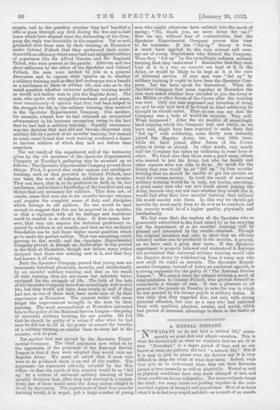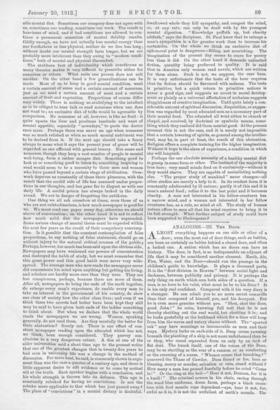A MENTAL DIETARY. "N OWADAYS we do not lead a natural
life," conse- quently we must diet and physic ourselves. This is what the doctors tell us when we complain that we are ill at ease. " Nowadays " is a vague period of time, and no one knows at what era patients did lead "a natural life." But if it is easy to pick to pieces what the doctors say it is very difficult to deny the truth of what they mean. Indeed, what they give us to understand when they use their favourite phrase is true mentally as well as physically. Mental as well as physical conditions have very much changed of late, and those conditions favour indigestion. Too many subjects tempt the mind ; too many minds are jostling together in the over• crowded regions of thought and speculation. Most of us know what it is to feel very stupid and dull—as a result of an unsuit-
able mental diet. Sometimes our company does not agree with us, sometimes our reading, sometimes our work. The result is heaviness of mind, and if bad conditions are allowed to con- tinue a permanent sensation of mental debility results. Oddly enough, we have not actually less mental energy than our forefathers or less physical, neither do we live less long ; without doubt our mental strength lasts longer, but we are probably more intolerant than they owing to " modern condi- tions," both of mental and physical discomfort.
The stubborn fact of individuality which overthrows so many theories makes it very difficult to prescribe either for ourselves or others. What suits one person does not suit another. On the other hand a few generalizations can be Made. Most of us, to keep in good mental condition, want a certain amount of sense and a certain amount of nonsense, just as we need a certain amount of meat and a certain amount of fruit and vegetables. Proportions of course differ very widely. There is nothing so stultifying to the intellect as to be obliged to hear talk or read nonsense when one does not want to ; an exclusive diet of trifle would be agreeable by comparison. No nonsense at all, however, is like no fruit : it quite upsets the liver and produces lassitude and want of mental appetite, especially " nowadays," to quote the doctor once more. Perhaps there was never an age when nonsense was so much relished or when so much mental nutriment was to be derived from it. If the next age should take a fancy always to mean what it says the present year of grace will be regarded as one afflicted with general lunacy. But sense and nonsense, though they keep a vast number of people in mental well-being, form a rather meagre diet. Something good to look at or something good to listen to, something inspiring to read would seem to be a necessity to those men and women who have passed beyond a certain stage of civilization. Over- work deprives us constantly of these three pleasures, with the result that the sordid side of life has assumed undue propor- tions in our thoughts, and has gone far to disgust us with our daily life. A sordid poison has always lurked in the daily round. We are in danger of forgetting the antidotes.
One thing we all ask ourselves at times, even those of us who are not valetudinarians, is how much newspaper is good for us. We must read one paper every day, otherwise we should starve of conversation ; on the other hand it is sad to reflect bow much solid diet the newspapers have superseded. Some serious change of mental tissue must be expected within the next few years as the result of their compulsory consump- tion. Is it possible that the constant contemplation of false proportions, to say nothing of false statement, should go on without injury to the natural critical acumen of the public p Perhaps, however, too much has been said upon the obvious side. Newspapers may have weakened our powers of concentration and destroyed the habit of study, but we must remember that this great power and this good habit were never very wide- spread. The average man who now reads the newspaper never did concentrate his mind upon anything but getting his living, and scholars are hardly more rare than they were. They are less conspicuous, perhaps, because there are more of them. After all, newspapers do bring the ends of the earth together, do enlarge every man's experience, do enable every man to take an interest in the government of his country, do show one class of society how the other class lives ; and even if we think these two secrets had better have been kept they still may be said to have given both ends of the ladder something to think about. But when we declare that the whole world reads the newspapers we are wrong. Women, speaking generally, do not read them. Are they mentally the better for their abstention ? Surely not. There is one effect of con- stant newspaper reading upon the educated which has not, we think, been enough considered. They purvey con- clusionsto a very dangerous extent. A don at one of the older universities said a short time ago to the present writer that one of the greatest changes that in twenty-five years he had seen in university life was a change in the method of discussion. Far more heat, he said, ie commonly shown in argu- ment than was the case a quarter of a century ago, and there is little apparent desire to sift evidence or to come by mutual aid at the truth. Each speaker begins with a conclusion, and his whole strength is thrown into its defence. This age is constantly rebuked for having no convictions. Is not the rebuke more applicable to that which has just passed away P The place of " convictions " in a mental dietary is doubtful. Swallowed whole they kill sympathy, and congest the mind, or, at any rate, can only be dealt with by the youngest mental digestion. "Knowledge puffeth up, but charity edifieth," says the Scripture. St. Paul knew that to enlarge a man's sympathies is a far greater work than to increase his certainties. On the whole we think an exclusive diet of ephemeral print is dangerous—filling, not nourishing. The imagination of the present day seems to crave for poetry less than it did. On the other hand it demands unlimited fiction, quantity being' preferred to quality. It is said that in America only women read novels, which are written for them alone. Such is not, we suppose, the ease here. It is very unfortunate that the taste of the hour requires that its fiction should be flavoured with sadness. The taste is primitive, but a quick return to primitive notions is never a good sign, and suggests an arrest in moral develop- ment as plainly as a universal affectation of archaism suggests sluggishness of creative imagination. Until quite lately a con- siderable amount of spiritual discussion, disquisition, or sugges- tion was regarded by most educated men as a necessary part of their mental food. The educated all went either to church or chapel, and received, by doctrinal or symbolic means, some- thing which they realized did them mental good. At the present moment this is not the case, and it is surely not impossible that a certain lowering of spirits, so general among the intellec- tual, may be, in part at least, the result of this abstention. Religion offers a complete training for the higher imagination. Without it hope is the slave of experience, a condition in which she will languish.
Perhaps the one absolute necessity of a healthy mental diet is gossip in some form or other. The instinct of the majority is true here ; very small minds feed on it exclusively—without it they would starve. They are capable of assimilating nothing else. " The proper study of mankind" never changes—all other studies are merely a help to it. In its crudest form it is constantly adulterated by ill nature; purify it of this and it is man's natural food ; refine it to the last point and it becomes charity. A man not interested in his fellow-creatures has a narrow mind, and a woman not interested in her fellow creatures has, as a rule, no mind at all. The study of human nature offers to man all that his mind requires to bring it to its full strength. What farther subject of study could have been suggested to Shakespeare P











































 Previous page
Previous page